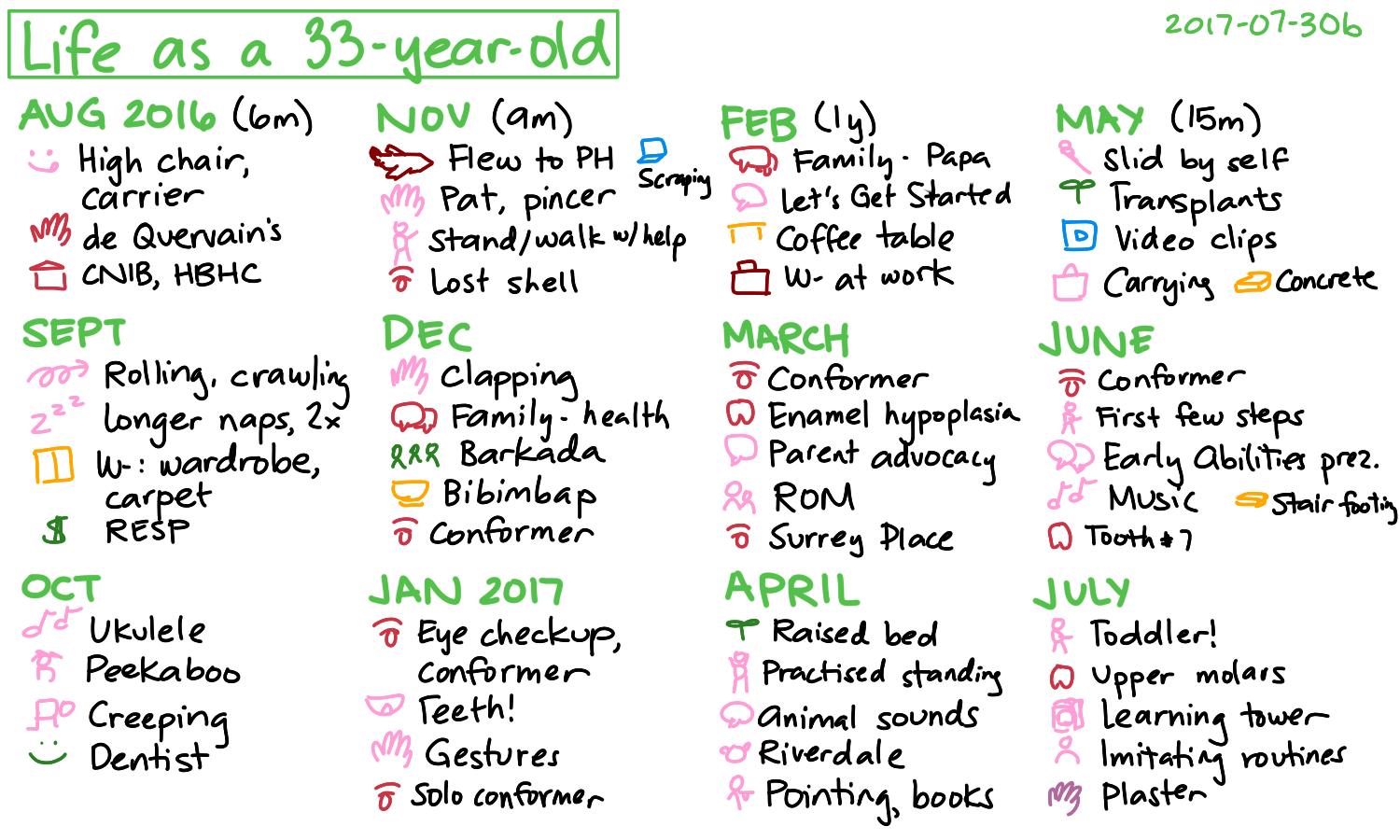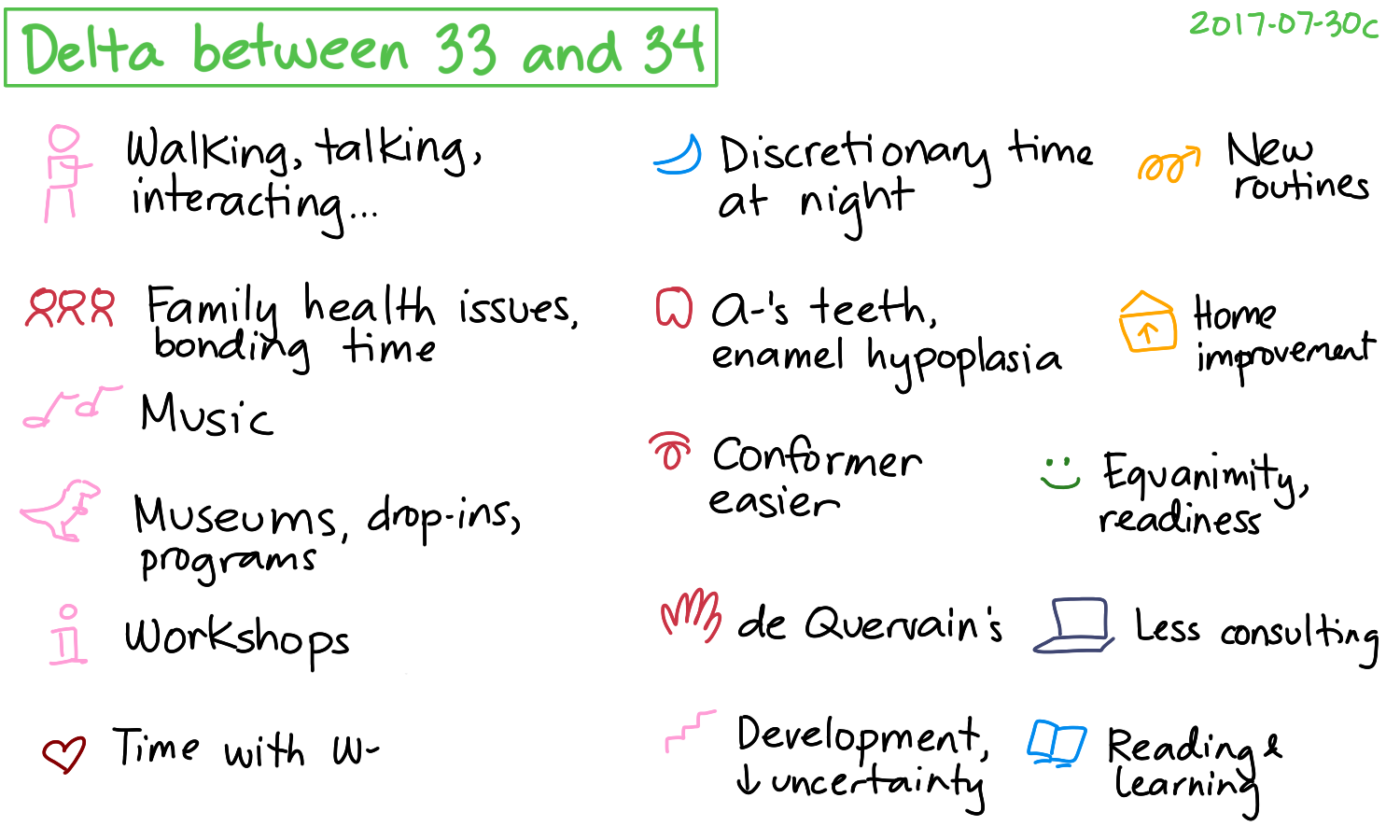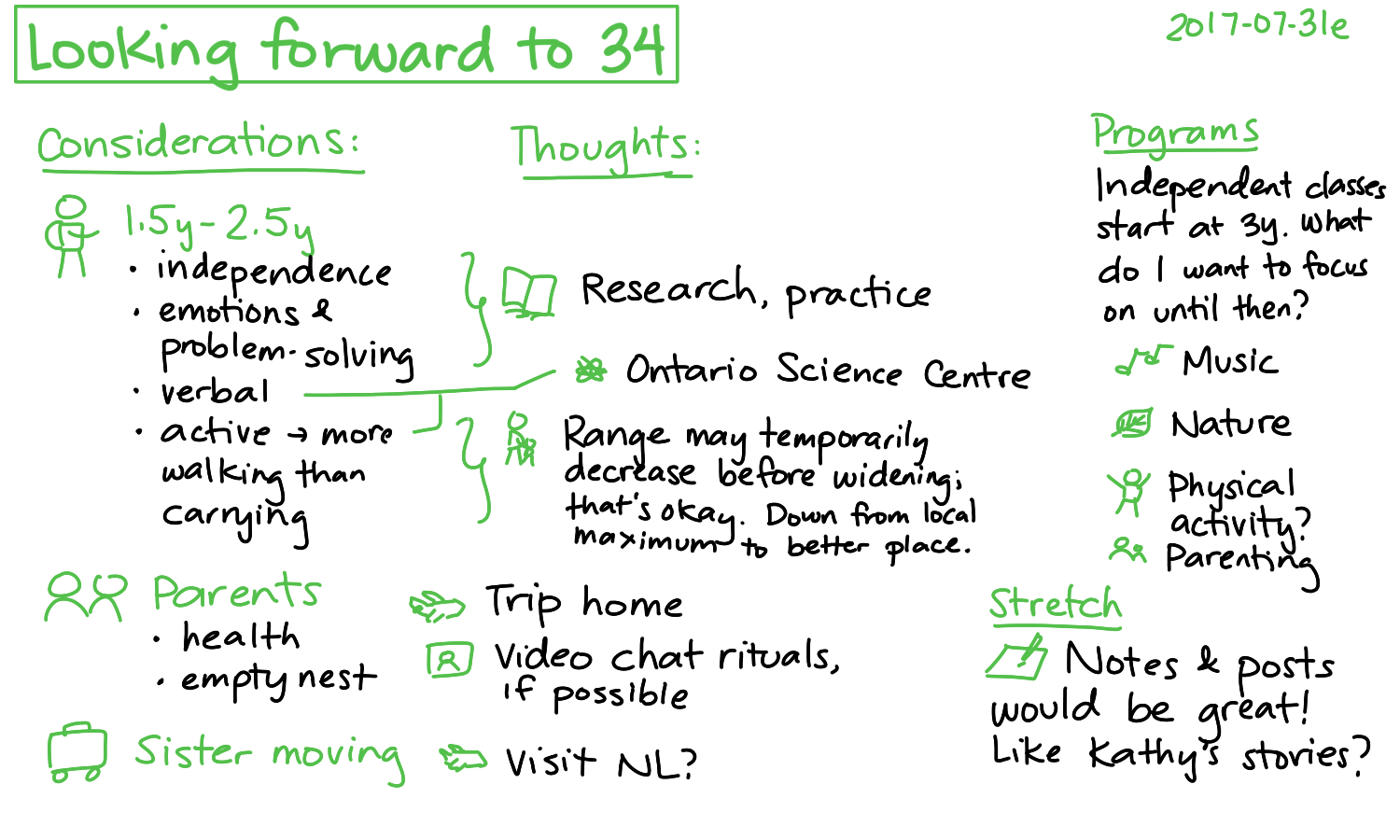Turning 34; life as a 33-year-old
| review, yearlyWhat a difference a year makes! In August 2016, we were just beginning to emerge from the tangle of diagnostic exams and new medical terms, trying to figure out what we needed to deal with. By August 2017, A- was walking, talking, interacting, and cheerfully developing on track, which was a great relief.
I’ve finally cleared some time to do my annual review, so here goes!
What happened this year?
We made the most of W-‘s parental leave with plenty of time together, a three-week trip to the Philippines to visit my family, and lots of home improvement (workshop, wardrobe, and part of a porch rebuild). After he went back to work, we established new routines which seem to be working quite well.
I checked out lots of parenting resources and workshops, consulted various agencies for help with assessing and monitoring A-‘s development, and gave myself a crash course in early childhood education. We’ve been making good use of our membership at the Royal Ontario Museum, and I’ve been singing lots of songs we picked up from circle times and toddler classes. I’m pleasantly surprised at how fun it is to learn about all sorts of stuff.
As we settled into regular routines, I reclaimed some discretionary time. It turns out that I can usually get an hour of discretionary time at night, if I stay up after A- has gone to bed. That’s been handy for updating my journal, doing some consulting (mostly SQL and a little prototyping), posting Emacs News summaries, and learning more.
What did I learn?
There were a few big uncertainties this year.
- What were the parameters we need to work with in terms of A-? Microphthalmia means regular trips to the ocularist and ophthalmologist, prostheses, and some adaptation in terms of vision and socialization. Her ventricular septal defect seems to have no impact on her growth, and just needs routine monitoring to check on the right ventricle muscle bundles. The liver hemangioma also needs routine monitoring. Enamel hypoplasia means being more careful about cleaning her teeth, with possible dental work later. She doesn’t seem to have any developmental delays. Also, she’s pretty darn awesome!
- Will I be able to adapt to stay-at-home parenting? This worked out surprisingly well, and I’m glad we structured our lives this way. I find it interesting, and I’m learning a lot. I’ve scaled down consulting because of time constraints and brain fuzziness, but that’s still okay. It’s been super-helpful to be able to adapt to A-‘s sleep schedule and interests.
- How do we want to parent? I resonate with ideas from attachment parenting, Montessori education, and a few other parenting philosophies. I’ve been pretty good at staying calm and managing the usual new-parent anxiety. I’m learning more about early childhood education and child development.
- What’s worth spending time and money on, and what can I postpone or avoid? Journaling has been very much worth it. Compiling Emacs News doesn’t take much time, and it’s been useful too. I can do enough consulting to keep my clients happy. Reading and improvement time pay off, too. I’ve also been able to do personal coding (mostly Quantified Awesome) and a tiny bit of sewing, but those are harder.We’ve been pretty frugal in terms of baby-related stuff, and keeping things simple has worked well for us. I started using the opportunity fund for A- – not because I think this will result in a prodigy, but because it’s enjoyable and good to explore all sorts of things together.
- What are the health challenges facing my family, and how can we support them? It was a tough year for my parents and my sister, and they’re not out of the woods yet. I can’t help much with the day-to-day stuff over the distance, but I can check in with them over Facebook, listen, share stories, let them interact with A-, help with research, and respect their decisions.
- What will it be like to take A- to the Philippines? Both A- and I got overtired on the flights during our first trip, so it really helped that W- was there. It was great being able to share the load with him on the ground, too. Nice spending time with family and friends!
A few questions I’ll explore this year:
- How can we make the most of A-‘s preschool years? I think this year will be mostly about helping A- learn self-care and household skills. The more she can do by herself, the more capable she’ll feel, and the less frustration she’ll have to deal with.Independent classes tend to start around 3 years old, so I have a little over a year of participating in classes together. Music classes and a museum membership have been a good fit for us, and I’d like to ramp up physical activity and add a membership to the science centre. (Oct 2017: The science centre has been worth it for us. We’re there practically every week!)
- How can I support W- as he takes on larger projects? Taking care of A- lets me free up time for W- to work on the porch, and reading about stuff helps me chat with him about the work he’s doing.
- What does my family need? We’re keeping some of W-‘s vacation time in reserve for another trip to the Philippines. I’m also chatting with them more, since A- responds to Facebook video chats. (Oct 2017: A- and I traveled by ourselves to the Philippines to spend a few weeks with my family. Doing an overnight layover made things a lot easier to manage. It was great to spend time with family. I started looking into paperwork, too.)
How have I changed?
Compared to last year, I’m more confident about parenting. I use general areas of child development to guide my observation and planning so that I can offer A- a variety of options, and then we follow her interests from there. As I expected, parenting is the sort of thing that gets more fascinating if I geek out about it.
I haven’t been able to code much, since I’ve been prioritizing sleep and my journal. I feel less articulate – like my brain occasionally gets a little tangled – but maybe that’s just because I’m more aware of speaking, or maybe that’s sleep deprivation. It’ll probably sort itself out over time.
I feel reassured by the way we’re dealing with things. It’s nice to be able to test Stoic philosophy and find that it works well for me.
How did I spend my time, and how do I feel about that?
| Category | % 32 years | % 33 years | Diff | h/wk | Diff h/wk |
|---|---|---|---|---|---|
| A- – Childcare | 14.9 | 39.2 | 24.4 | 65.7 | 41.0 |
| Business – Build | 0.4 | 0.5 | 0.1 | 0.8 | 0.2 |
| Discretionary – Social | 0.9 | 1.1 | 0.1 | 1.8 | 0.2 |
| Business – Connect | 0.7 | 0.1 | -0.6 | 0.1 | -1.0 |
| Unpaid work | 7.5 | 6.8 | -0.7 | 11.3 | -1.2 |
| Discretionary – Family | 3.0 | 1.4 | -1.6 | 2.4 | -2.7 |
| Sleep | 37.4 | 34.0 | -3.4 | 56.9 | -5.7 |
| Business – Earn | 4.5 | 1.2 | -3.4 | 1.9 | -5.7 |
| Discretionary – Play | 5.7 | 1.5 | -4.2 | 2.5 | -7.0 |
| Personal | 15.4 | 10.4 | -5.0 | 17.4 | -8.4 |
| Discretionary – Productive | 9.7 | 3.6 | -6.1 | 6.0 | -10.3 |
Childcare went way up, of course, since I had a kiddo for 100% of my life as a 33-year-old and 50% of my life as a 32-year-old. That took time away from pretty much everything else, but I’m okay with that. I’ve worked out a sleep pattern that usually lets me feel pretty rested: try not to stay up more than two hours longer than A- does, and nap when I can.
An hour or two of discretionary time isn’t quite enough to get deep into code. Fortunately, my consulting clients are super-flexible, and we can pick tasks that fit with the constraints on my time and concentration.
What is a typical day like?
We usually wake up when A- feels like waking up, which is around 11 AM or so. Some days, I set an alarm and wake up earlier so that I can take care of things or gently nudge A- towards being awake. After a relaxed breakfast, we head out for appointments, errands, or informal field trips. We might have lunch outside or at home, depending on the timing. A- usually naps in the carrier at some point. When we get home, we have an afternoon snack, tidy up, and play some more. We reconnect with W- when he gets home, and we might go for a walk to the supermarket together. We help make dinner, eat, tidy up, pack our lunches for the next day, and prepare for bed. We read a few stories, then settle in – sometimes with W-, and sometimes in A-‘s room.
What am I looking forward to?
Life as a 34-year-old will probably look like:
- Embracing every stage as we go through it
- Helping A- develop self-care skills and participate in household life
- Going on a couple of trips to the Philippines to spend time with family and sort out paperwork



